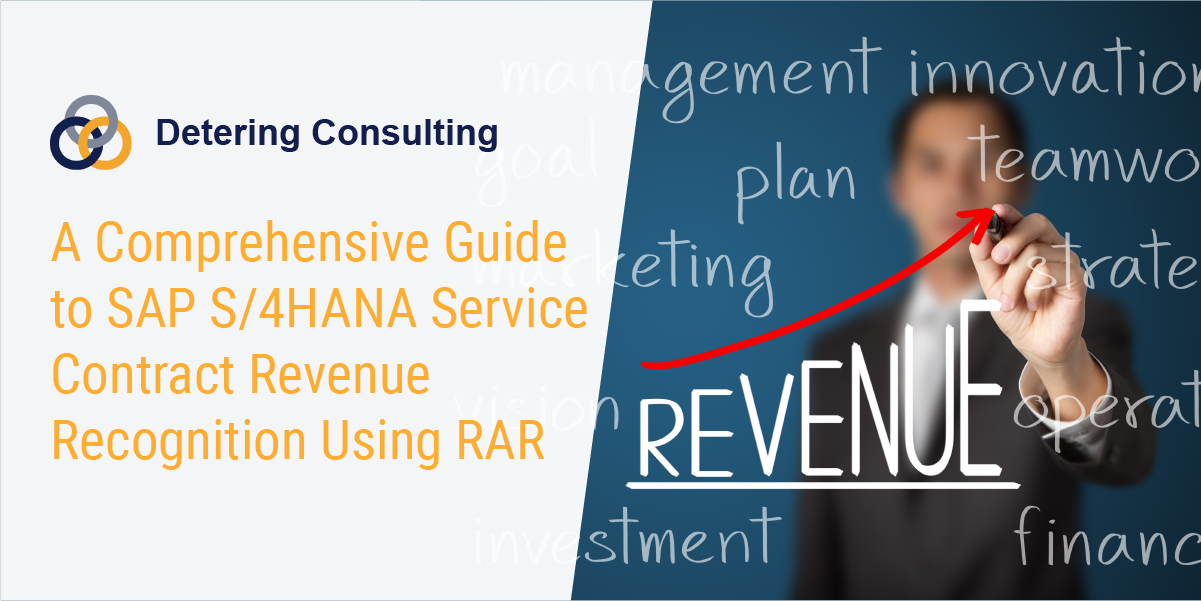Revenue recognition for many businesses is a complex reporting function with many specific business requirements – both legal and business-related which guarantees compliance with GAAP rules. GAAP rules must also be considered in the methodology used in reporting revenue from different sources.
Service contract revenue presents additional challenges in revenue recognition which your financials system must handle, due to many contributing factors such as:
- How contracts are billed (annually, quarterly, monthly, one-time)
- Duration of contracts – potentially months or even years
- Additional charges over and above included entitlement coverage
- Termination of contract – at expiration date or early termination
For financial departments charged with ensuring compliance and accurate reporting of service contract revenue, this guide will focus on the challenges, requirements, performance obligations, and options for reporting contract revenue in SAP S/4HANA using SAP Revenue Accounting and Reporting (SAP RAR).
What are the Common Challenges in Service Contract Revenue?
In order to meet certain performance obligations, auditors and financial services providers continuously revise and refine standards for how and when revenue from various business functions must be recognized. These standards must first be fully understood to ensure compliance with accounting rules that satisfy these requirements and stand up to independent audits. The SAP revenue recognition configuration settings must be continuously adjusted so that SAP Revenue Accounting Reporting reflects these changes to revenue realization rules. It can also require the application of enhancement packages, from SAP ERP 6.0 onwards.
Meeting FASB Requirements
Financial Accounting Standards Board (FASB) Topic ASC 606 – Revenue from Contracts with Customers – includes a significant revision in GAAP rules for businesses on how and when to report service contract revenues. Recognition is based on a five-step framework that, when combined, creates the standard for revenue recognition.
1. Identification of Customer Contracts
Service contracts are legal and binding agreements between your business and customers. Entitlements, obligations, and pricing are established for the life of the agreement. This standard also provides for the recognition of circumstances where a contract may be changed.
2. Entitlements – Performance Obligations
Each element that is promised to the customer must be itemized in the contract. These constitute a promise for provided goods and services as long as they can be identified as distinct and separate entitlements to the customer. This standard provides for exceptions in such instances where the goods or services may be bundled – together representing a total product – or where the applicable items are tightly related to other goods and services referenced in the contract details.
Establishing pricing contained in a service contract must take several factors into account:
- Discounts, refunds, returns, rebates, and any applicable performance bonuses
- Any variations that present a constraint on pricing estimates
- Financing options and considerations
- Consideration for payments other than cash
- Any agreed-upon payments due the customer under the contract
Special consideration is addressed when a third party is involved in providing the goods and services. The significance is when the contract owner (principal) provides the goods and services, gross revenue should be recognized. If an agent (third party) owns control, net revenue should be recognized.
4. Transaction Price Allocation
Allocating the price of each transaction related to contract obligations is based on a comparable or relative price basis if the items were sold or provided separately instead of as part of the service contract.
This price is determined by identifying the price of similar products or services the client would provide to a similar customer. Some alternatives can be utilized if there are no stand-alone sales of the same entities:
- Estimated adjusted market value
- Expected cost of the entity plus margin
- Residual value approach
- Combination of these options
Complex contracts allow providers to exercise a level of judgment in how pricing of performance for activities is allocated, as well as how discounts or rebates are applied to each activity.
5. Revenue Recognition
Revenue recognition is generally realized as obligations – goods or services – that transfer control to the customer are delineated in revenue accounting contracts. Judgment on the part of the client determines whether the transfer takes place at a particular point in time or over time. This should also be reflected in billing systems.
There are exceptions to this point of the framework as well, such as where the customer is billed for products or services, but the client retains the product in storage until delivery is requested.
Compliance with this standard published by FASB can be a complicated process for financial teams and SAP S/4HANA users. Many companies are challenged with accurately reporting service contract revenue recognition within FASB guidelines.
IFRS 15
The International Financial Report Standards (IFRS) Foundation published IFRS 15 to further document the five steps of the above revenue recognition framework. IFRS 15 is essentially the same as ASC 606, but businesses must ensure their revenue accounting complies with each standard. This standard also includes clarifications established for specific circumstances.
Additional Challenges
Beyond dealing with and complying with accounting guidelines and auditable results, businesses have other challenges in recognizing revenue properly.
Service Contract Termination
Termination presents an additional challenge for financial reporting of revenue. Any early termination penalties should be clearly identified in the contract. If billing documents have been generated for the contract over one or more periods, judgment is required in determining the payment due the client or refunds due the customer.
Often an amendment to a service contract may be significant enough to require the termination of an existing contract and the creation of a new contract. In such cases, adjustments may be required to the revenue previously realized at the initialization of the old contract, based on the remaining life of the agreement.
Time-Based Revenue Recognition
One of the major challenges of realizing revenue recognition from service contracts is the need for time-based or periodic posting. With time-based recognition, billing documents are posted to an accrual account. Revenue is posted evenly over the life of the contract, with the appropriate portion of the accrual being transferred to revenue each period.
Time-based revenue recognition is an ideal accounting solution for long-term service contracts.
Event-Based Revenue Recognition
Like time-based recognition, event-based revenue recognition software generates an accrual for revenue, which is transferred to revenue based on an actual event such as service confirmations or service orders related to the service contract.
Why Revenue Recognition is Important to Your Business
As service contracts are written and executed, revenue recognition is taken depending on different actors:
- Upfront or initial revenues from service contracts are recognized up front, while those revenues that are time-based (as those received over the life of the contract) are accordingly recognized over the same periods. Additionally, when contracts contain milestones such as usage or performance thresholds, revenue is recognized as those milestones are reached.
- As a provider of service contracts, you are charged with constantly evaluating and estimating contract performance, recording commissions, or one-time fees over the life of each contract to ensure compliance with financial reporting standards – and to satisfy financial audits.
These challenges are critical to your financial well-being, as the determination of revenue that will be reported on financial statements can have a significant impact on the appearance of your revenue generation and overall financial performance.
Revenue recognition software offers a solution for managing contracts and reporting revenue recognition efficiently and accurately, without the continuous monitoring and estimating that would need to be undertaken by contract managers and financial teams. This is critical for revenue streams that may occur of long periods of time.
How SAP RAR Addresses the Complex Problem of Managing Service Contract Revenue Recognition
SAP HANA Revenue Accounting and Reporting (SAP RAR Module) has been developed to help companies with consistent and accurate reporting of revenue recognition from service contracts. By offering accounting solutions for service contracts, RAR ensures compliance with FASB ASC 606 and IFRS 15 guidelines.
For many companies, revenue calculation is posted through a period-based accrual method. In such cases, the revenue is realized not in the period when the billing document is generated, but in the posting period when the service or product was actually provided.
RAR can facilitate the transfer of revenue recognition to SAP S/4HANA independent of the creation of billing documents. Revenue can be posted to the period that coincides with the billing document or to a period after or prior to the billing. Note: Should you be running SAP ECC, a different revenue recognition program is used that is part of SAP SD.
Through implementing SAP S/4HANA Revenue Accounting and Reporting, your business can solve many of the challenges of recognizing revenue efficiently and consistently.
Software driven revenue recognition enables your sales teams, financial resources, and management to focus on business-critical tasks such as service contract management, profitability, and serving your customers. Implementing a software solution that recognizes changes in contracts and reports revenue accurately ensures compliance with accounting standards. This helps to optimize operating profit and revenue growth.
Detering Consulting Can Help You Implement SAP RAR
SAP RAR was developed specifically to help SAP S/4HANA users deal with and manage the requirements of ASC 606 and IFRS 15. Detering Consulting has senior-level SAP consultants that help our customers implement RAR successfully to reap the benefits of this SAP application:
- Compliance with financial standards – adherence to 5-step framework rules
- Support for multiple-element service contracts
- Processing of multiple entitlements and performance obligations
- Automatic allocations of transaction prices
- Supports manual updates to contracts as needed
- Event-driven revenue recognition, including percent of completion and time based
This is of course only a partial list of RAR features. Detering consultants can discuss your business needs and reporting challenges in more detail.
Discover how your financial and service contract management processes can be streamlined with SAP RAR. Contact us today.


